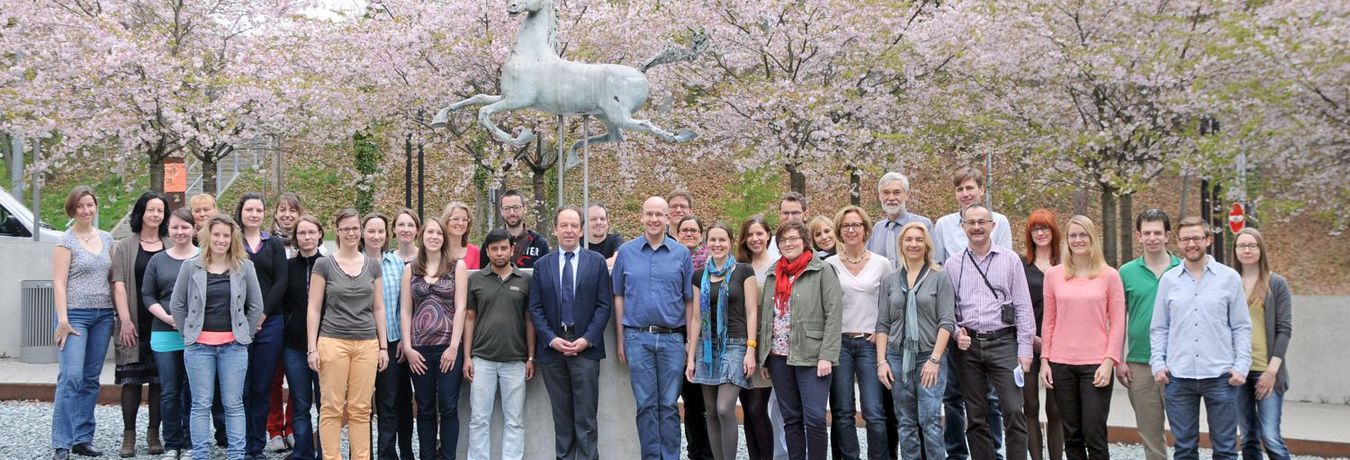Head

apl. Prof. Dr. rer. nat. Gudrun Strauß
Ulm University Medical Center
Department of Pediatrics and Adolescent Medicine
Eythstr. 24 (Research Lab, House 16)
89075 Ulm, Germany
phone: +49-731-500 57033
fax: +49-731-500 57042
e-mail: gudrun.strauss@uniklinik-ulm.de
Research Profile
A functional immune system protects from disease development and autoimmunity. The immune response therefore requires a tight control to ensure that immune cells eliminate invading pathogens but do not attack the body’s own cells. Various molecular processes and cell types are involved in the regulation of the immune response.
The main focus of our research group deals with the regulation of the T cell immune response and the development of new treatment strategies for graft-versus-host disease (GVHD) prevention. GVHD is the major complication after allogeneic bone marrow transplantation leading to increased morbidity and mortality. T cells in the donor transplant, which are activated by antigens of the recipient, expand and subsequently attack and destroy recipient tissues thereby inducing GVHD. During the last years we have established several murine models of GVHD mimicking the human transplantation situation.
Currently we are working on the following projects:
Death receptors were initially characterized to induce apoptosis after ligation with their cognate death ligand. Nowadays, however, it is clear that death receptors have additional functions. We have recently investigated the influence of death receptor CD95 and TRAIL on T cell activation and define for the first time, that CD95 and TRAIL-receptors suppress T cell activation when stimulated by death ligands during T cell priming. This mechanism might contribute to immune evasion of viruses or other pathogens, which induce death ligand expression in target cells after infection.
GVHD is characterized by recipient organ destruction induced by activated T cells. Since activated T cells strongly up-regulate death ligands we are exploring whether blocking of death ligand functions might serve as a possible treatment option in GVHD prevention. Destructive functions of activated T cells, however, can also be abrogated by suppressor cells. Myeloid-derived suppressor cells (MDSCs) are an immature population of myeloid cells inhibiting T cell activation, proliferation and function and are therefore under investigation for GVHD-prophylaxis. T cells do not represent a uniform population of cells but are subdivided in different subpopulations due to their phenotype and function. The impact of different T cell subpopulations especially Th9 cells on GVHD development is studied.
The immune response after traumatic injuries is predominated in the beginning by on overwhelming pro-inflammatory response of the innate immune system, followed by a suppression of the adaptive immunity leading to immunosuppression and an enhanced risk for all types of infections. At present, the impact of MDSCs on the course of disease and the immune response after trauma is not well defined. Using murine trauma models we determine the influence of trauma on the induction of MDSCs, define their potential to modulate T cell-mediated immune responses in order to clarify whether interference with MDSC development might be a therapeutic option after trauma.
- Prystaz K, Kaiser K, Kovtun A, Haffner-Luntzer M, Fischer V, Rapp AE, Liedert A, Strauss G, Waetzig GH, Rose-John S, Ignatius A. Distinct Effects of IL-6 Classic and Trans-Signaling in Bone Fracture Healing. Am J Pathol. 188:474-490, 2018.
- Hüsecken Y, Muche S, Kustermann M, Klingspor M, Palmer A, Braumüller S, Huber-Lang M, Debatin KM, Strauss G. MDSCs are induced after experimental blunt chest trauma and subsequently alter antigen-specific T cell responses. Sci Rep. 7:12808, 2017.
- Messmann JJ, Reisser T, Leithäuser F, Lutz MB, Debatin KM, Strauss G. In vitro-generated MDSCs prevent murine GVHD by inducing type 2 T cells without disabling antitumor cytotoxicity. Blood. 126:1138-48, 2015.
- Theiss-Suennemann J, Jörß K, Messmann JJ, Reichardt SD, Montes-Cobos E, Lühder F, Tuckermann JP, AWolff H, Dressel R, Gröne HJ, Strauß G, Reichardt HM. Glucocorticoids attenuate acute graft-versus-host disease by suppressing the cytotoxic capacity of CD8(+) T cells. J Pathol. 235:646-55, 2015.
- Lehnert C, Weiswange M, Jeremias I, Bayer C, Grunert M, Debatin KM, Strauss G. TRAIL-receptor costimulation inhibits proximal TCR signaling and suppresses human T cell activation and proliferation. J Immunol. 193:4021-31, 2014.
- Hartmann N, Messmann JJ, Leithäuser F, Weiswange M, Kluge M, Fricke H, Debatin KM, Strauss G. Recombinant CD95-Fc (APG101) prevents graft-versus-host disease in mice without disabling antitumor cytotoxicity and T-cell functions. Blood. 121:556-65, 2013.
- Fabricius D, Breckerbohm L, Vollmer A, Queudeville M, Eckhoff SM, Fulda S, Strauss G, Debatin KM, Jahrsdörfer B, Meyer LH. Acute lymphoblastic leukemia cells treated with CpG oligodeoxynucleotides, IL-4 and CD40 ligand facilitate enhanced anti-leukemic CTL responses. Leukemia. 25:1111-21, 2011.
- Hartmann N, Leithäuser F, Albers C, Duyster J, Möller P, Debatin KM, Strauss G. In vitro-established alloantigen-specific CD8(+) CTLs mediate graft-versus-tumor activity in the absence of graft-versus-host disease. Leukemia. 25:848-55, 2011.
- Strauss G, Lindquist JA, Arhel N, Felder E, Karl S, Haas TL, Fulda S, Walczak H, Kirchhoff F, Debatin KM. CD95 co-stimulation blocks activation of naive T cells by inhibiting T cell receptor signaling. J Exp Med. 206:1379-93, 2009.
- Strauss G, Westhoff MA, Fischer-Posovszky P, Fulda S, Schanbacher M, Eckhoff SM, Stahnke K, Vahsen N, Kroemer G, Debatin KM. 4-hydroperoxy-cyclophosphamide mediates caspase-independent T-cell apoptosis involving oxidative stress-induced nuclear relocation of mitochondrial apoptogenic factors AIF and EndoG. Cell Death Differ. 15: 332-43, 2008.
